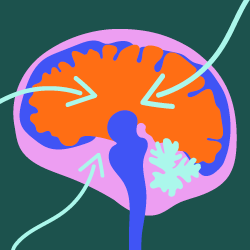
At the Crossroads of Innovation and Policy, People Suffer
Public policy should help shape and protect the health and well-being of our population. At Sage, we believe policy should foster innovation, not dampen it; it should expand quality access to care, not restrict it.
Sage is a biopharmaceutical company focused on brain health. On our journey thus far to deliver innovative brain health medicines, we’ve experienced success as well as failure. Developing medicines to treat complex brain conditions is hard, but fundamental to our decision to give up or keep going is always the patient.
One of the areas we are focused on is depression, both major depressive disorder and postpartum depression, an area that has had very little innovation in decades.
We know that innovation will transform current standards of care, but good public policy accelerates the impact – they are inextricably linked. Recent policymaking at the federal level, along with the confluence of policies at the local and state levels, threatens this necessary and infinite feedback loop.
At Sage we believe mental and physical health are equally important components of overall well-being. A cancer diagnosis, for example, rightly triggers action to provide urgent medical intervention.
That same urgency should apply to the treatment of mental health.
Instead, people with mental health conditions often face a patchwork of archaic policies that delay necessary treatment and interfere with provider-patient relationships. Today’s step therapy policies, which require people to try and fail one or more insurer-chosen medications before they gain access to the treatment prescribed by their physician, illustrates the failure of the status quo. The trial-and-error approach that step edits cause is not best for those suffering, for their families, or for society.
Prompt diagnosis of and early treatment intervention for depression is known to improve outcomes and save lives. However, the average wait time for an appointment with a psychiatrist is 25 daysi.
Once treatment is initiated, people generally need to remain on antidepressants for more than 6 weeks before seeing any resultsii, and after that amount of time, around two-thirds of people treated for depression fail to achieve treatment success with a first-line therapyiii.
Overall, people with depression could wait weeks to months before benefitting from treatment if it occurs at all. Throughout the course of their depression, people often cycle through treatments, hoping to find one that works for them. In addition, many patients experience bothersome and persistent side effects, and as a result many physicians are concerned that patients will discontinue treatment altogether. Receiving treatment quickly could make a world of difference – the difference between languishing at home and being able to work, care for one’s family, and enjoy life.
Unfortunately, for those suffering, that is not how our system is structured to provide care today.
Sage supports a future in which mental health is taken seriously and treated with urgency; a future in which mental health is integrated with physical health and managed with a mindset that puts people first. At Sage, we see our role as contributing to healthcare policy discussions that make clear how new science can help people with mental health conditions, ensuring that novel treatments are accessible to all who need them, when they need it. People have no time to wait.
Elected leaders take office with promises to deliver health care reform and break down the barriers to greater health equity. With the 118th Congress having just convened and state governments now back in session across the country, join me in promoting access to mental health treatment innovation and holding policymakers accountable for improving mental health equity. You can do so by reaching out to your state and federal representatives today.
To help those in need- the time to act is now!
i Malowney M, et al. Availability of Outpatient Care From Psychiatrists: A Simulated-Patient Study in Three U.S. Cities. Psychiatric Services. 2015;66:94-96.
ii US Food and Drug Administration. Major Depressive Disorder: Developing Drugs for Treatment Guidance for Industry (06-2018). https://www.fda.gov/media/113988/download. Accessed 03-30-2021.
iii Pigott HE. The STAR*D Trial: It is time to reexamine the clinical beliefs that guide the treatment of major depression. Can J Psychiatry. 2015;60(1):9-13.


